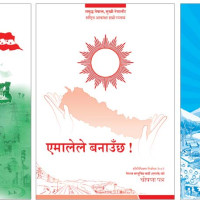- Friday, 20 February 2026
Challenges To Resume Public Services
Regular public services have remained affected in one way or another across Nepal in the wake of the Gen Z demonstrations due to a lack of working spaces, important records and equipment. Many office buildings of public bodies under the federal, provincial and local governments were destroyed during the protests, leaving them utterly dysfunctional. In such a situation, it has been a huge difficulty for many public institutions to deliver services to people efficiently and effectively. However, with the formation of the interim government, efforts are underway to clean up debris scattered on the premises of different ministries, departments and other offices and manage charred vehicles. Staffers and other people seem to have been working tirelessly to start their office activities again.
As the existing structures of some federal ministries, including the Health and Population, Education, Science and Technology, and Home Affairs, were deemed unfit for operations, these ministries have been relocated elsewhere to enable them to restart their services. The Supreme Court (SC) has also resumed its judicial service from makeshift tents installed in the courtyard of its damaged building. Anyway, the resumption of these services has enhanced the level of confidence of the people, to some extent. Many other courts across the country have also suffered huge damage. It may take a long time for those courts to start delivering services in a full scale.
Damage assessment
It is worth noting that the federal government has begun carrying out a rapid visual assessment to take stock of losses caused to the public buildings and other structures during the ferocious Gen Z protests. Based on an assessment report, the government will come up with plans for the reconstruction of the buildings completely damaged and retrofitting of those partially ruined. The country is estimated to have incurred a loss worth hundreds of billions of rupees owing to the devastation of public properties. Preliminary estimates show that more than 3,000 government vehicles, including four-wheelers and two-wheelers, were charred nationwide during the demonstrations. The figure is likely to exceed.
Provincial and local governments have already started collecting data on the number of vehicles burnt to ashes and others suffering partial damage. Naturally, it is not easy for civil servants to resume delivering services to people as per the latter’s wishes when vehicles and other basic amenities are not available. However, civil servants appear to have been playing a proactive role in running the offices lying in ruins. They have been involved in cleaning up their offices, restoring equipment and providing necessary services to the people. As they are known as a ‘permanent government,’ they now must prove their mettle by dedicating themselves to serving the nation and people in these testing times.
The elected people’s representatives at the provincial and local levels also have a vital part to play in returning the current unfavourable situation to normalcy. They must try their best to provide services to people and carry out development activities. It is also the responsibility of all the political parties to join forces with government agencies to ease service delivery. It is, however, commendable that the parties have started mobilising their cadres and supporters for refurbishing public offices to restore services at the provincial and local levels. There is no doubt that political parties are the key stakeholders of every election. So, they must take the people into confidence by extending necessary support and assistance to them.
With the delegation of powers to the local levels, ward offices are now responsible for delivering a myriad of services to the people. But many ward offices based even inside the Kathmandu Valley seem to have been in full operation because of recent arson and vandalism. Many service seekers are found visiting different ward offices to pay property taxes and receive various other services. But they are deprived of such services owing to the closure of ward offices for an indefinite period. Against this backdrop, the elected local people’s representatives, political parties and common people must come together to resume ward office services at the earliest possible.
Security
The common people, including Kathmandu denizens, are not assured of security yet, with more incidents of criminal activities like theft and robbery reported daily. After getting panicky, the locals appear to have opted for forming their ‘security teams’ that monitor their respective localities at nighttime to prevent untoward activities. With the mobilisation of community people regularly for their own security, they must have felt safe, to some extent. They have taken this initiative as the Nepal Police posts have yet to be reinstated fully. What was worrying was that there was widespread devastation of police posts during the protests.
However, the community people still feel it necessary to have police posts restored. Their concern is genuine as criminals become more active when security personnel are not mobilised in adequate numbers. The government also seems to be quite serious about reinstating all the police posts to ensure security for people and public infrastructures. It is imperative to do so, considering a mass escape of criminals from different jails nationwide. Thousands of such individuals had broken prisons forcibly, cashing in on the fragile security situation during the Gen Z protests.
(The author is a former deputy executive editor of this daily.)














